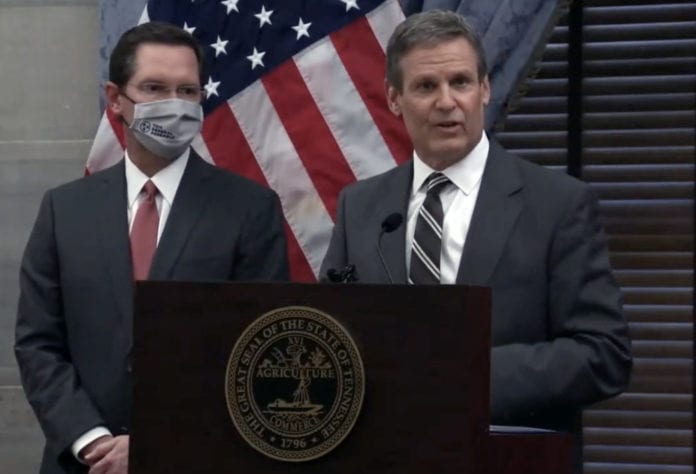NASHVILLE — Tennessee lawmakers on Friday finished tackling education issues that surfaced during the pandemic(backslash) as Republicans fumed that some districts still are not back in classrooms but declined to act on their proposal to withhold state funding for staying virtual.
The brief four-day special session sparked various conflicts inside the Republican-dominant Statehouse over the best measures to help struggling teachers and students amid the coronavirus outbreak. However, ultimately, GOP lawmakers easily pushed through Republican Gov. Bill Lee’s agenda.
“This is really important. Implementing this is going to be difficult and it’s going to take awhile, but we have to try,” said state Sen. Ferrell Haile, a Republican from Gallatin. “Opportunities present themselves, this is an opportunity we have to take advantage of.”
For months, the state’s top education officials have raised alarms that students have experienced serious adverse learning effects that could plague them for years. Lee’s administration has focused on Tennessee’s dismal third-grade reading scores, warning that student learning was suffering outside the classroom.
One proposal that passed would require third graders to meet a certain reading score threshold or risk not advancing to fourth grade starting in the school year 2022-23. If signed into law, Tennessee would join a growing number of states — roughly 20 to date — that demand third-grade students pass a reading score benchmark or flunk.
The legislation allows third graders who don’t meet the mark to advance if they successfully retest, receive intensive tutoring or succeed at new summer reading school offerings.
With additional training on teaching literacy and the summer schools, the bill will cost the state an estimated $67.3 million the first two years, some of which will be funded by federal welfare dollars for families with children.
The legislation includes several exceptions, but the idea has remained controversial among education advocates who point out that students who flunk a grade are more likely to drop out. In Tennessee, more than 60% of third-grade students failed to test as proficient on their reading scores.
“We know you’re far less likely to succeed and graduate if you are held back, but we’re creating a default where 62% of our students fall in that category,” said state Sen. Jeff Yarbro, a Nashville Democrat.
Meanwhile, teacher advocates have questioned the pay raise amount that lawmakers advanced. The proposal includes $43 million through a special session bill and, according to Lee, more money later in the state budget. Lee said it would equate to a 4% increase in the salary component of the education funding formula, though that doesn’t necessarily equate to 4% raises.
Last year, Lee proposed funneling an additional $117 million to K-12 teacher salaries before the outbreak hit. Yet the idea was nixed, along with many other spending items, at the outset of the pandemic.
Finally, lawmakers also passed legislation that state testing will continue to occur this spring, but teachers, schools and districts won’t be punished for potentially poor scores.
Some Democrats were concerned that the exams would still need to be taken in person, not online.
From the session’s outset Tuesday, the governor set a tough tone on districts going back to in-person learning.
He commended schools that have opened for in-person learning for not choosing “the path of least resistance” and said officials “can’t say, ‘Follow the science,’ and keep schools closed.” That prompted rebuttals from critics, who say Lee should use the same appeal to medical expertise and finally implement a statewide mask requirement, since studies have shown better outcomes in Tennessee counties that require masks.
The back-and-forth over in-person schooling resulted in GOP majority legislative leaders proposing a bill that would let the Tennessee education commissioner withhold state funding if a school district can’t provide at least 70 days of an in-person schooling option during the 2020-2021 school year.
The political pressure to reopen classrooms drew rebukes from district officials in Nashville and Shelby County, which includes Memphis — two more left-leaning urban centers that have largely remained virtual during the pandemic.
Noting the disproportionate effect of the pandemic on Black and brown communities, Shelby County Schools Superintendent Joris Ray chided state leaders for sending a “mixed and hypocritical message,” and beckoned them to “ step away from privileged podiums and try to understand the many concerns of our students, parents, and teachers.”
Though Lee’s administration didn’t propose the bill, a spokesperson indicated that the governor’s position on the bill is to “defer.” That means he didn’t oppose the bill and would have likely signed off on it — if it were to pass. GOP legislative leaders indicated the bill will be back for the regular session, which resumes in earnest on Feb. 8.
(By Associated Press reporters Kimberlee Kruesi and Jonathan Mattise.)



